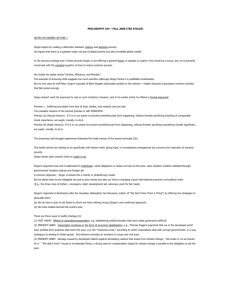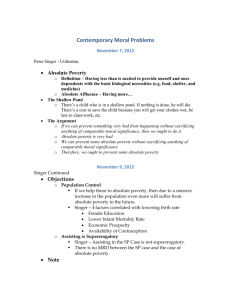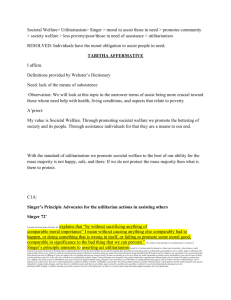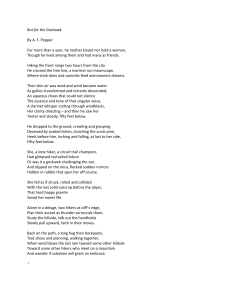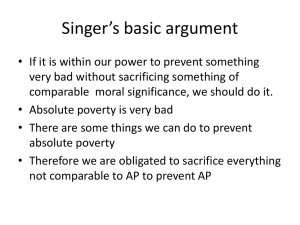Utilitarianism and Peter Singer
advertisement
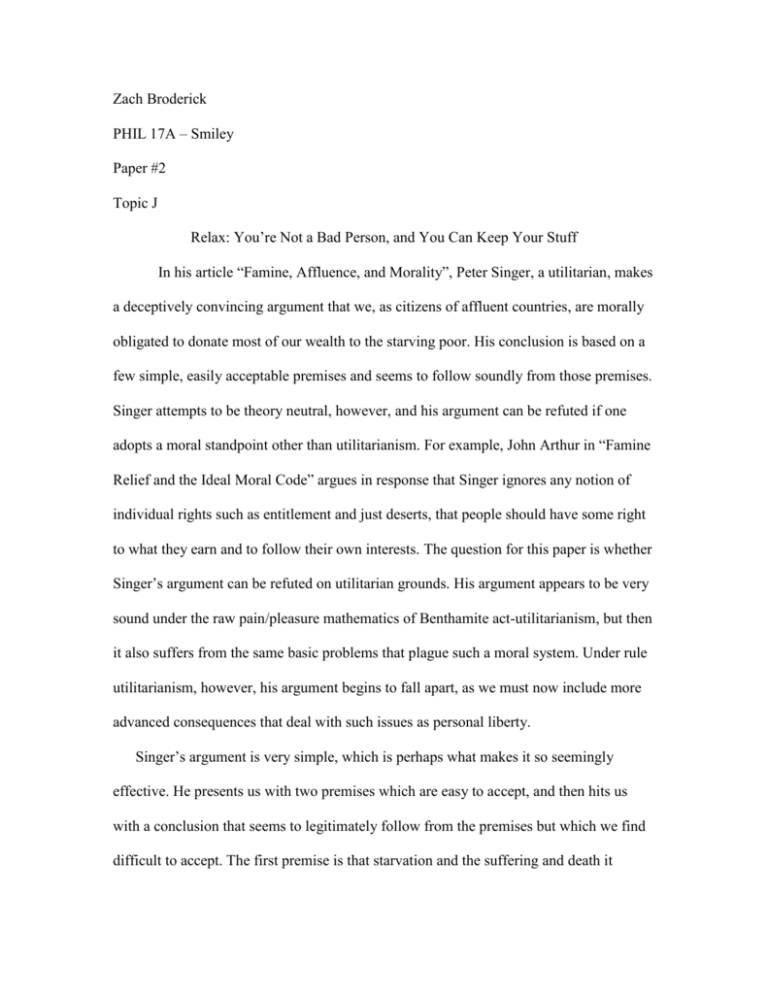
Zach Broderick PHIL 17A – Smiley Paper #2 Topic J Relax: You’re Not a Bad Person, and You Can Keep Your Stuff In his article “Famine, Affluence, and Morality”, Peter Singer, a utilitarian, makes a deceptively convincing argument that we, as citizens of affluent countries, are morally obligated to donate most of our wealth to the starving poor. His conclusion is based on a few simple, easily acceptable premises and seems to follow soundly from those premises. Singer attempts to be theory neutral, however, and his argument can be refuted if one adopts a moral standpoint other than utilitarianism. For example, John Arthur in “Famine Relief and the Ideal Moral Code” argues in response that Singer ignores any notion of individual rights such as entitlement and just deserts, that people should have some right to what they earn and to follow their own interests. The question for this paper is whether Singer’s argument can be refuted on utilitarian grounds. His argument appears to be very sound under the raw pain/pleasure mathematics of Benthamite act-utilitarianism, but then it also suffers from the same basic problems that plague such a moral system. Under rule utilitarianism, however, his argument begins to fall apart, as we must now include more advanced consequences that deal with such issues as personal liberty. Singer’s argument is very simple, which is perhaps what makes it so seemingly effective. He presents us with two premises which are easy to accept, and then hits us with a conclusion that seems to legitimately follow from the premises but which we find difficult to accept. The first premise is that starvation and the suffering and death it 2 causes are bad things. This is relatively undisputed and is not where we will focus our attention. The second premise also appears obvious at first, but in fact it is where the argument’s weakness lies, as I will demonstrate later on. Singer proposes that if we are able to prevent something bad from happening without sacrificing anything of [comparable] moral significance, then we ought to do it. He uses the example of a child drowning in a shallow pond—we might get our clothes muddy if we were to save the child, but certainly we ought to do it. After the premises are firmly established, Singer presents us with his conclusion: that we ought to donate most of our wealth to the world’s poor, in order to prevent them from starving, previously established as a bad thing. In fact, we should donate to the point where, if we were to donate any more, we would be causing ourselves as much suffering as we are preventing to someone else. At the very least, we should forgo that diamond necklace—certainly, looking spiffy is not as morally significant as starving to death. The above is essentially Singer’s argument in condensed form. Let us rewind to the second premise for a moment, as it is the most important. In his postscript written a few years later, he mentions that he purposefully does not define what is “morally significant” because he wants his argument to appeal to subscribers of all ethical theories, not just utilitarians like himself. He assumes that most people, regardless of ethical theory, would agree that the necklace is not as morally significant as someone starving to death. But is that necessarily the case, once taken on the broader scale of rule-utilitarianism? Are we in fact morally obligated to prevent harm whenever we can? In the following I will show that Singer’s assertion likely holds under Benthamite act-utilitarianism, but might be refuted under rule-utilitarianism. 3 Let us now look at Singer’s argument under the lens of act-utilitarianism. The first premise seems obvious enough; under utilitarianism, a bad thing is that which results in pain, and certainly suffering and dying from starvation is painful and bad. The second premise is a little trickier but still holds. I will divide it into two parts for easier analysis. First, we need to define the measure of “moral significance” under act-utilitarianism, which states that an action is good or bad depending upon how much pleasure it brings about or equally, how much pain it prevents. In its most basic form, we would judge the morality of an action by adding up all the pain and pleasures it causes, and if there is net pleasure, we might consider it a good action, and if net pain, a bad one. We might conclude then, and Singer seems to support this conclusion, that moral significance is measured in terms of pain and pleasure, which is hardly a stretch under normal conceptions of utilitarianism. Thus, when Singer speaks of sacrificing up to the level of comparable moral significance, under utilitarianism it simply means donating one’s wealth, in order to prevent pain, until donating any more would result in causing as much pain (likely to oneself) as it would prevent to others. This, as Singer acknowledges, would require one to reduce themselves almost to the condition of the starving poor they are donating their money to. Therefore it would seem that the amount Singer would have us donate is consistent with the utilitarian conception of moral significance. The second part we must address is whether we have a moral obligation to prevent such pain from happening if we can. This is where Singer’s argument runs into trouble with our cultural norms. We generally only think of ourselves as having negative responsibilities—that is, we are obligated to refrain from doing certain things that would 4 cause harm to others, such as killing and stealing. As Arthur points out, however, Singer’s argument introduces positive responsibility—that it is actually our moral duty to do something, rather than simply not doing something. In Western culture, such positive acts are typically relegated to the realm of charity. Utilitarianism however is one of the major ethical theories that happens to, in certain forms, support the notion of positive responsibility. As a moral agent, one is morally obligated to act in a way which would bring about the greatest happiness. Whether such an action is positive or negative is irrelevant to the pain or pleasure produced, and thus no distinction is morally necessary. The second premise would seem to be acceptable under utilitarianism, and because Singer’s conclusion logically follows from the premises, it would appear his argument as a whole is sound under act-utilitarianism. Before we continue, it is worth noting that the point of the paper is not to argue that Singer is correct; the purpose of this last section on act-utilitarianism was to show that his argument is strongly grounded in the theory. If an individual is considering donating his wealth to the hungry, a solid case can be made that such an action would be utile. Of course, it is also possible for someone to argue that it is not utile under act-utilitarianism; such is the nature of utilitarianism. However, act-utilitarianism is not the only accepted form of the theory. Ruleutilitarianism is another form of utilitarianism that differs from act-utilitarianism in that it judges the utility of rules rather than individual acts. Pain and pleasure are still the measures of moral significance, and are used to judge whether a given rule is good or bad. The rules themselves are then used to judge the morality of individual acts. In this way, we ask not “would this act promote the greatest happiness” but rather “if everyone 5 acted according to this rule, would it promote the greatest happiness?” Richard Brandt provides a very nice and basic definition when quoting J. O. Urmson: A. B. A particular action is justified as being right [in the sense of being morally obligatory] by showing that it is in accord with [is required by] some moral rule. It is shown to be wrong by showing that it transgresses some moral rule. A moral rule is shown to be correct by showing that the recognition of that rule promotes the ultimate end. While this form of utilitarianism comes with its own set of problems, it does have some advantages. For one, it is more practical. Rules are similar to laws, and can be easily implemented by the state. As far as personal morality goes, it is difficult for an individual to calculate the utility of every potential action; following a set of basic utile rules, however, is not so hard. Rule-utilitarianism has also been used to integrate conceptions of liberty and justice, which are difficult to reconcile with act-utilitarianism. In order to judge Singer’s argument under rule-utilitarianism, we must formulate his conclusion as a rule. Let us consider then the following: Everyone ought to donate as much of their wealth as they can to the starving poor, up to the point where giving any more would cause more suffering than it would prevent. We must now judge the utility of this rule, in order to determine whether we can accept Singer’s argument under ruleutilitarianism. At this point, many different arguments could be made both for and against the utility of this rule. I am going to offer a few brief points against the utility of Singer’s conclusion, in order to demonstrate that his argument can in fact be refuted on utilitarian grounds. The point of this paper is to do just that, rather than actually attempt to comprehensively refute Singer’s claim. The truth is, rule-utilitarianism could be used to 6 argue in either direction, though I happen to believe the following arguments are the strongest and do in fact show that such a rule is not utile. In order to judge the utility of a moral rule, we must look at the consequences of everyone following that rule; that is, doing what they morally ought to. A reasonable prediction would be that world economic conditions even out—everyone has just enough to survive, and any additional wealth gained is donated to the person who needs it most. Considering the ever growing world population and limited global resources, this prediction is not a stretch, and would likely follow from the moral rule we just proposed. If everyone did their moral duty, it would seem to follow that no one person could have significantly more than anyone else, as it would not be utile. The situation I have just illustrated however is not much of a case against the utility of Singer’s conclusion. In fact, it may just demonstrate the opposite—who’s to say everyone living in minimal but equal conditions is not preferable to having billionaires while millions starve? I would argue though that there are other economic consequences that are far more clearly on the side of disutility. Before I continue I would like to preface that I realize economic arguments are generally unreliable due to our limited understanding of economic consequences. However, the following are very basic and do not demand much imagination, though they are hardly definitive. Remember, my point is not to be definitive, but rather to show that a strong case can be mounted against Singer on utilitarian grounds. I would argue that if everyone did as they ought to under Singer, the resulting economic consequences would significantly shrink the amount of global wealth and resources, thereby leaving everyone worse off than they were before. That is, there would 7 perhaps be even more people starving than there were previously. I will present two very simple, very probably consequences that might reasonably result in this disutile situation. The first is best demonstrated by an example, nicely articulated by John Arthur in his aforementioned essay, though for a different purpose: Suppose an industrious farmer works hard and produces a surplus of food for the winter while a lazy neighbor spends the summer relaxing. Must our hard working farmer give the surplus away because that neighbor, who refused to work, will suffer? This classic example is often used against Communism, though in this case, Arthur was arguing against Singer using the notion of entitlement. One could formulate entitlement into a utilitarian rule, and argue that Singer’s rule is in conflict with it; this is one of the difficulties commonly encountered with rule-utilitarianism. I will take a different approach to arguing this same point. Under Singer’s rule, the notion of entitlement vanishes, as one is only entitled to what they need to prevent more suffering to themselves than others. Without entitlement, the incentive to be productive is taken away; you are not rewarded with the fruits of your labor. Similarly, there is no punishment for being unproductive, as someone else will be morally obligated to provide for you. The result is an immensely less productive world, and thus there are fewer resources to go around, resulting in the situation I posited above. This is hardly economic speculation, but rather observable human nature. My second point is more economic in nature, but I feel it is warranted as it is addressed by Singer in his essay. He concedes that if everyone did as they ought to, our consumerist economy would slow down or perhaps even disappear entirely, but that this would probably be a desirable outcome; at any rate, we should calculate how much of our GDP to give in order to maximize donations. This appears to be completely incompatible 8 with his earlier assertion that we should sacrifice to the level of marginal utility. More importantly though, I would argue that he severely underestimates the impact of such an economic slowdown. It is rather uncontroversial that our current level of global production, including that of food, is made possible by a complex and fragile system of economic institutions and forces. Understanding of this system is what tends to be controversial, and the lack of it is what makes philosophical arguments based on economics questionable. However, one only need look back on history to see that even a small disruption of this system can have catastrophic results, plunging the wealthiest nations into poverty; the Great Depression, which was hardly exclusive to America, comes to mind. It is difficult to fathom the effects of cutting consumption in the way Singer suggests; it is not hard to imagine that production and thus global resources will be significantly impacted. Let us put this all together, for the sake of clarity. If Singer’s conclusion were made into a moral rule, where everyone had a moral duty to donate their wealth to the poor up to the level of marginal utility, the following two consequence would likely arise: the notion of entitlement would disappear, leading to a lack of motivation to be productive; and, the lack of consumption of trivia might trigger a global economic collapse. Both of these consequences would most likely result in a severe reduction in overall production, and thus significantly less global resources to go around. Therefore, we would all likely be worse off than we were before, proving Singer’s rule disutile. While not definitive, nevertheless we have a strong case against Singer’s argument on utilitarian grounds, namely rule utilitarianism. 9 In conclusion then, I would like to reiterate the following: Peter Singer makes a very persuasive argument for charity as a moral duty that seems compatible with an actutilitarian ethical outlook. As I have just shown, though, it is possible to make a strong case against Singer’s argument on utilitarian grounds as well, using rule-utilitarianism. What are we to take away from this analysis? Those of us who were uncomfortable with Singer’s conclusion but found it difficult to refute can relax, secure in the knowledge that we are not terrible people after all, and that we can keep all our stuff.
